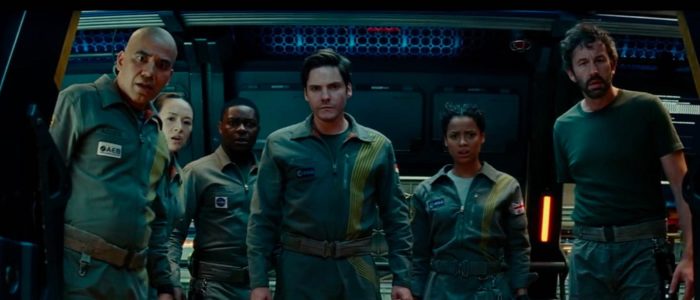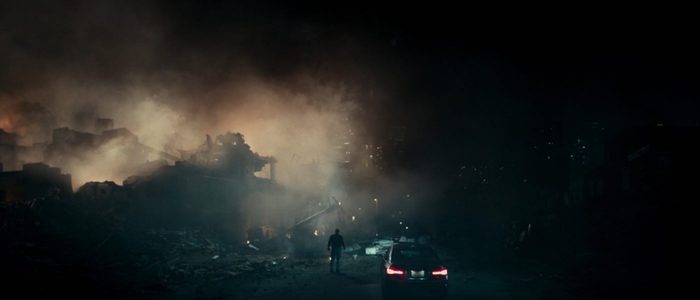'The Cloverfield Paradox' Review: In Space, No One Can Hear You Screw Up A Franchise
Warning: This Cloverfield Paradox review contains spoilers.
The curious, accidental Cloverfield franchise gets a new addition with the long-delayed The Cloverfield Paradox. After lengthy reshoots, and shuffling through various possible release dates, this latest entry in the Cloverfield series made history with a surprise trailer dropped during the Super Bowl, and a surprise release on Netflix immediately following the game. But is it a step in the right direction for the series, or a major misfire? There's something to be celebrated here: keeping The Cloverfield Paradox top-secret and making it suddenly available on Netflix is a way to ensure that everyone has a chance to view the film on the same level playing field. There's no early buzz, no early hype, no early negative word. Everyone goes in fresh. That's the positive way of looking at things. The negative way would be to say that the producers behind The Cloverfield Paradox, including J.J. Abrams, realized the film was such a colossal dud that they knew they'd be better off dumping it onto a streaming platform instead of going through the trouble of a wide theatrical release.Originally titled God Particle, The Cloverfield Paradox hails from an original screenplay by Oren Uziel. Like the surprisingly excellent 10 Cloverfield Lane, The Cloverfield Paradox did not begin its life as a Cloverfield sequel. Yet at some point, producer J.J. Abrams and the folks at Bad Robot got ahold of the project and tailored it to fit into the franchise. This could've worked – it worked for 10 Cloverfield Lane, after all. But for some truly strange reason, a decision was made to tie this film more directly to the original Cloverfield. As a result, The Cloverfield Paradox becomes two completely different movies, and neither holds water.There is a good movie in here, somewhere. A longer runtime, giving the narrative more room to breathe and the characters more development, would've been a wiser choice. Instead, The Cloverfield Paradox is rushed to the extreme, sprinting towards a conclusion that ultimately feels like a huge middle finger to an audience that wants nothing more than to see this franchise succeed.
Cloverfield In Space
When The Cloverfield Paradox opens, an energy crisis is close to bringing the world to its knees. The only solution is to send a team of diverse, international astronauts up to the Cloverfield Space Station, where they'll use a particle accelerator dubbed The Shepherd that will somehow magically fix all of earth's problems. Among the crew is Ava Hamilton (Gugu Mbatha-Raw), who is still coming to terms with her grief over the death of her two children.In one of the film's best touches, director Julius Onah covers a period of days, weeks, months and ultimately years before the opening credits have finished. We're presented with a montage of sorts with the crew preparing for their world-saving mission aboard the space station, all while a digital clock on the wall ticks off how long they've been in space, counting all the way up to a whopping 623 days. Around day 694, the team is ready to fire up that particle accelerator, and before anyone has even touched a button, we know this won't end well.We know this because The Cloverfield Paradox is loaded with clunky exposition, where characters are prone to say things like "If we don't do this, there won't be enough energy left in the whole world." Mere minutes before the crew of the Cloverfield Space Station turns on The Shepherd, they watch a news interview with a scientist (Donal Logue, in a quick cameo) warning that turning on the particle accelerator will be super bad and likely create a rift in time and space and possible unleash demons. Yes, he really uses the word demons.Sure enough, after the crew flips the switch, shit hits the fan. After some minor destruction to their ship (and a brief loss of gravity), the crew composes themselves only to discover, with more annoyance than outright terror, that the earth has vanished. This is a great set-up – the kind of idea that makes for a truly stellar episode of The Twilight Zone. Unfortunately, once The Cloverfield Paradox presents us with this, it then proceeds to race clumsily towards a silly conclusion that borders on nonsensical.Meanwhile, back on the (vanished) earth, Ava's husband Michael (Roger Davies) is dealing with his own problems. There's a giant, unseen presence storming through the city, laying waste to everything. The Cloverfield Paradox takes great pains to not show us the creature destroying the city, but it's clear to anyone familiar with the franchise that this is meant to be the same monster from the original Cloverfield. The question is: why? Why is this subplot in the movie at all? I doubt anyone involved with the film could provide a concrete answer to this question.Back on the space station, things go from bad to worse very quickly. In a truly effective, nightmarish sequence, the crew finds a woman walled up inside a hallway, her body bloody and entangled with pipes and wires. Once they free the woman (played by Elizabeth Debicki) and treat her wounds, she shocks everyone even more by revealing she knows all of them, and that she was, in fact, a member of their crew. Of course, the crew has no idea who this woman is, or where she came from. Slowly but surely it all becomes clear: the particle accelerator has zapped our characters into a parallel dimension. So far so good, right? Well, don't get too comfortable. 
A Wasted Opportunity
Perhaps what makes The Cloverfield Paradox so frustrating is that it squanders the gifts it has been given. The Cloverfield franchise was on track to be one of the most promising and most interesting attempts at cinematic world building in recent memory. Rather than make straight-up sequels, Bad Robot was crafting creative genre pictures under the Cloverfield banner, sort of like feature-length Twilight Zone episodes, where the stories may not be directly connected, but they all act as part of the same strange, otherworldly multiverse. 10 Cloverfield Lane came seemingly from nowhere and delivered a masterfully written film that managed to be both a character drama and a big, bold sci-fi picture. All the pieces are in place for The Cloverfield Paradox to do the same, but it never proves up to the task.Worse, still, is the fact that the film ultimately wastes a phenomenal cast. Gugu Mbatha-Raw's Ava is the only character who stands out, and Mbatha-Raw is, as usual, wonderful. But the actress deserves better than this; she deserves to lead a good sci-fi tentpole film, not whatever this is. The cast around Mbatha-Raw includes David Oyelowo, as the ship's captain; Daniel Brühl, as a suspicious scientist; and Chris O'Dowd, offering a bit of comic relief. The rest of the crew is rounded out by Ziyi Zhang, John Ortiz, and Askel Hennie.But who are any of these people? Aside from O'Dowd's comic relief bits, the rest of these characters are utterly blank. We learn literally nothing about them. Oyelowo, a powerful actor on even his worst day, is completely left out to dry playing a character who has nothing even close to a personality. The only other character who gets any sort of development besides Mbatha-Raw's Ava is Debicki's Jensen, and even then the character ends up saddled with a heavy-handed plot twist that lacks any common sense. It's not all dire. The design of the film – that is to say, the costumes, the look of the ship, and the futuristic tech on display – all comes off well, and seems both practical and believable. The score, by 10 Cloverfield Lane's Bear McCreary, is often haunting and exhilarating. And The Cloverfield Paradox truly shines when it allows itself to get weird. Once the characters find themselves in this alternate dimension, the rules they know and live by no longer apply. This results in some genuinely laudable moments, including a very funny sequence where a character's severed arm comes to life and proceeds to crawl across the floor, a gross-out moment where a character loses control of one of his eyes, and a disturbing scene in which a character vomits up thousands of worms.Unfortunately, these moments are few and far between. The rest of the film is full of that never-ending exposition and characters making preposterous decisions that leave the viewer on the verge of throwing up their hands and exclaiming "What the hell is this?" For example: Debicki's Jensen, who has literally materialized out of nowhere in the walls, tells the crew that Brühl's character is not to be trusted, and they instantly believe her. That's just one of many ludicrous moments that pepper The Cloverfield Paradox and we haven't even really touched on the bullshit happening back on earth. These earth scenes are clearly the result of reshoots, and one wishes the filmmakers had never even bothered as they add almost nothing to the narrative. Director Julius Onah occasionally reveals a distinct visual eye: a shot of a video being projected on a window, filmed from outside said window while drifting through space, is legitimately haunting and arresting, and a moment on earth, where something huge and shadowy drifts through a plume of smoke surrounding a wrecked building, will give you chills. But far too often, Onah seems to have decided that Battlefield Earth was the sci-fi film he most wanted to emulate, and populates The Cloverfield Paradox with a plethora of dutch angles.The Cloverfield brand still has life. Already, there's talk of Cloverfield 4 – originally a war movie called Overlord, about allied troops discovering potentially supernatural Nazi experiments. It sounds like a neat premise, but so did the premise of The Cloverfield Paradox and look how that turned out. Bad Robot needs to decide what they want this franchise to be: do they want to take clever, original genre stories and release them under the tried and tested Cloverfield name, or do they want to take original scripts and rewrite them into the ground, awkwardly shoehorning in Cloverfield connections here and there. They can't have it both ways.If Cloverfield is to continue, and there's no reason it shouldn't, it would be wise if the producers took a long, hard look at what they did with 10 Cloverfield Lane, and use that as the gold standard to move forward. As for The Cloverfield Paradox, it will likely enjoy a nice, comfortable home on Netflix, where it can be easily streamed with little to no effort, and then and promptly forgotten about.